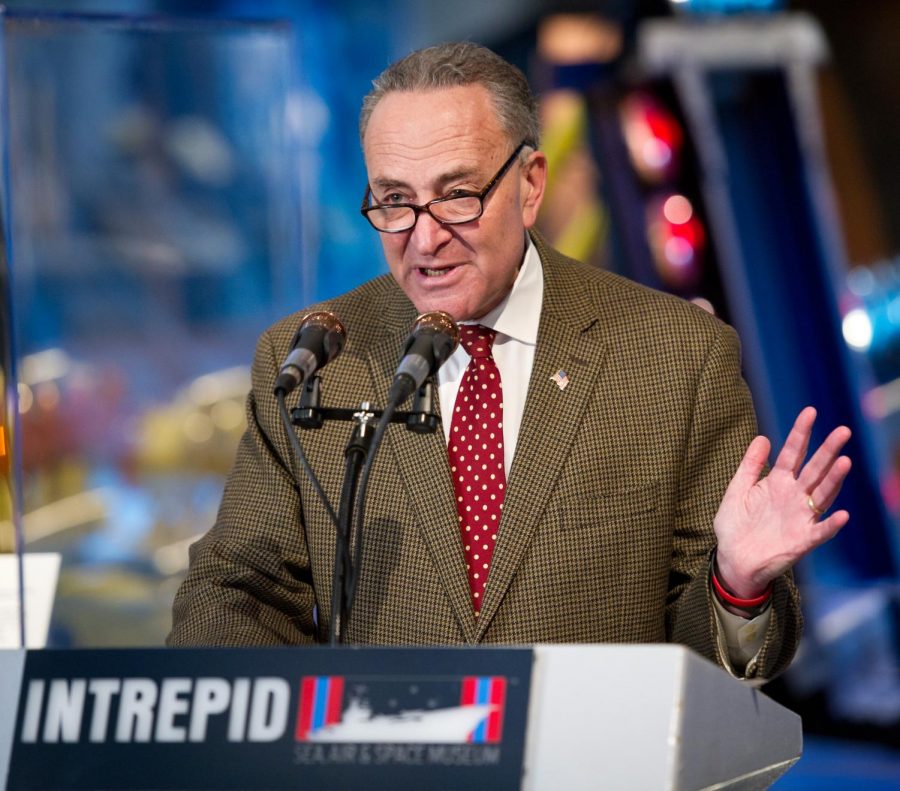Breaking Down The Senate Budget Bill
Courtesy of Bill Ingalls Senate Minority Leader Chuck Schumer had a key role in the tax bill as a lead negotiator and draftee.
With the government shutdown underway on February 8, the Senate passed a new deal for raising spending limits early morning February 9, exceeding budget caps imposed by the 2011 Budget Control Act. Unleashed by Senate Majority leader Mitch McConnell, this bill will boost military and non-defense spending to about $300 billion over the next two years as a compromise between Democrats and Republicans disagreeing over spending limits. Early Friday morning, the Senate voted 71 to 28 and the House of Representatives passed with majority votes of 240 to 186.
After disagreements on The Deferred Action for Childhood Arrivals (DACA), as well as lack of disaster-relief fund appropriation, the Senate unveiled the bill to concede to senators calling for immigration reform, along with $90 billion for disaster relief. Furthermore, $80 billion will be added to defense for the 2018 fiscal year and $85 billion for 2019. There will also be spending to expand community health centers and funding for the National Institute of Health, which appealed to democratic and more liberal legislators working to improve Medicare and other medical insurance policies.
The Minority leader for the House of Representatives, Nancy Pelosi, opposed the budget by holding the House floor in a speech lasting over eight hours, as she and her fellow Democrats were adamant on securing congressional legislation for protecting previous DACA recipients. Within the budget bill, there are plans to increase funding of the Children’s Health Insurance Program for medical clinics and children’s hospitals.
Pelosi claims that this is a weak solution for the DACA crisis because it had been included after protest in the repeal. Senator Rand Paul also tried to filibuster the Senate floor in order to stall voting on a plan that would limit Medicare benefits. By calling to other senators, he referred to the criticism of then-President Obama’s management of the national debt with deficits ranging from $600 billion to over $1 trillion. On the other hand, Senate Minority leader Chuck Schumer believes that the attempt to please DACA-siding Democrats with the Children’s Health Insurance is subpar as “there’ll be no incentive to negotiate, and we’ll be right back here in a month with the same problems,” as reported by the New York Post.
Schumer is one of the lead negotiators and draftees of the bill and has had the ability to negotiate directly with President Trump on potentially avoiding a costly government shutdown. From the Republican’s side, Senator Mike Lee of Utah told the New York Times that the bill is “a betrayal of everything limited government conservatism stands for.” Senate Majority Leader Mitch McConnell’s push for the bill made him the lead supporter in persuading both sides of the legislative branch to support it. McConnell’s plan for appropriating about $165 billion towards military and defense earned President Trump’s support, expressing how “Our military will now be stronger than ever before…Also means JOBS, JOBS, JOBS!”
Additionally, Speaker of the House Paul Ryan emphasized the drastic increase in defense spending as a tactic to gain Republican support. With the increase in budget caps, the United States is ranked first in military spending, with estimates to spend $652 billion in the 2018 fiscal year, according to the Department of Defense. Despite opposition towards the raised spending cap, Ryan and other Republicans reiterate the importance of allowing the United States military to serve to the best of its ability. Ryan vowed to find solutions for DACA, which had been repealed by President Trump in September 2017, reiterating the promise of other Congress members of uniting both political parties.
In order to increase federal spending for medical coverage by $17.5 billion, the bill will remove the Medicare Advisory Board, which was implemented under the Affordable Care Act in order to provide efficient care and improve the quality of treatment for those under Medicare.
With the board gone, this will allow medical clinics and children’s health providers to improve with this extra funding. With nine million children covered by the Children’s Health Insurance Program, both parties intended on making concessions through improving the quality of treatment. The increase in spending will allow people covered through Medicare to receive cheaper medicine.
With the bill signed by President Trump on February 8, it marks the highest spending budget in place, with greater technological advances and medical coverage on the horizon. However, the bill also increases the national deficit to $1.2 trillion. Despite this steadily increasing debt, lawmakers believe that the spending will be beneficial in the long run because it would encourage both parties to come together to increase disaster relief aid and coverage for lower-income families and children.
As the 2018 fiscal year begins, politicians like Nancy Pelosi and Chuck Schumer question the avoidance of immigration reform, and Americans are left wondering how this bill and new tax deductions will play out.






